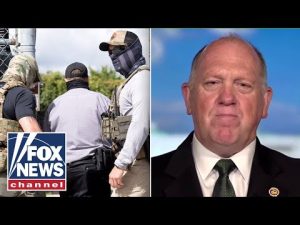In a bold new approach to combating the relentless drug cartels wreaking havoc in the United States, President Trump is reportedly considering serious military action. This comes on the heels of a recent operation that resulted in the striking of a narco-terrorist boat, eliminating 11 members of the infamous Tren de Aragua gang. In a move that has many buzzing, Trump raised the bounty on Venezuelan President Nicolás Maduro’s head to a staggering $50 million. This shake-up is aimed at tightening the vice grip on an increasingly dangerous situation involving drugs flowing across borders and terrorizing American communities.
U.S. Customs and Border Protection officers recently intercepted a jaw-dropping $37 million worth of methamphetamine from a commercial truck in Laredo, Texas. Under the Trump administration, such seizures have become alarmingly common, pointing to a deeply entrenched link between drug trafficking in Mexico and China. Shipments of precursor chemicals, like the 1,300 barrels arriving from Shanghai, indicate a coordinated effort to saturate American streets with dangerous drugs. Luckily, a recent interception prevented the Sinaloa Cartel from getting its hands on 700,000 pounds of critical components necessary for meth production — a record-breaking bust that has authorities breathing a little easier.
But not everyone is convinced that the action is enough. In a recent escalation, Venezuelan military aircraft flew dangerously close to a U.S. naval vessel, causing quite a stir. In response, President Trump did not miss a beat, making it clear that such provocations would not be tolerated. Under his command, the Pentagon has been authorized to take action if these planes stray into hazardous territory. For Trump, it seems that the message is loud and clear: The U.S. military is prepared to safeguard its interests, and any aggressive maneuvers by foreign adversaries will be met with strength.
As the war on drugs continues, Trump’s administration is also working to combat the tragic plague of drug overdoses plaguing Americans, especially young people. With over 80,000 overdose deaths reported last year, most caused by potent substances like fentanyl, the stakes couldn’t be higher. New synthetic opioids are emerging on the market, posing an even greater risk; substances like nitazenes can be as much as 40 times more potent than fentanyl. Responding to this crisis, a new bipartisan bill known as the Design Control Act aims to eliminate legal loopholes that traffickers exploit and hit the flow of drugs head-on.
Trump’s decisive actions are not just about immediate military strategies; he’s also rebranding parts of the government to reflect a renewed commitment to national security. By restoring the Pentagon’s designation back to the “Department of War,” he’s drawing from a history of strong military victories. This rebranding symbolizes a shift away from the politically correct tendencies that some believe have weakened American resolve. President Trump’s approach is a clarion call for “peace through strength,” ensuring that America conducts itself with both offensive and defensive strategies firmly in place.
In a world where threats continue to evolve, President Trump’s strong posturing against drug cartels suggests that he’s willing to take drastic measures to protect American lives. The focus will be on eliminating the dangerous intersections of international crime where cartels work hand-in-hand with foreign entities, and Trump seems committed to ensuring that this time, America stands resilient. With humor, determination, and perhaps a little bit of swagger, he is poised to remind the world that the U.S. is far from soft and ready to reassert its influence on the global stage.







